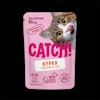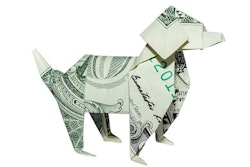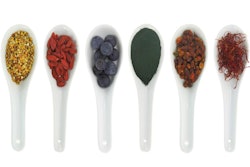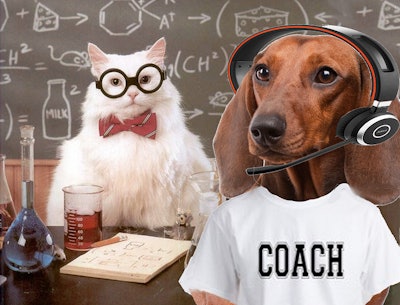
In my last blog post, “Fake news: Petco drops pet food with artificial ingredients,” I walked you through Petco’s November 2018 announcement that it would be “the first and only major retailer of pet food to not sell pet food and treats with artificial ingredients.” By the end of the article, you were likely as disappointed as I was when I found out that not all artificial colors, flavors or preservatives were banned (nor the ones in their own foods). Never mind the audacious goal of turning their back on all artificial foods.
Petco’s damage control and follow-up
Following the release of my post, I was contacted via email by Petco’s head veterinarian on March 14. To Petco’s credit, they wanted to start an open and constructive dialogue. The goal was to dive deeper into my article and address the concerns head-on with the key decision-makers for Petco. Of course, I obliged, since my goal in writing the original post (and this one) was to improve transparency of their claims and to ensure their messaging was not misleading. After all, if Petco truly were to remove all artificial flavors, preservatives and colorants, they would certainly be a trendsetter.
On March 24, I had a conference call with the head veterinarian and the rest of Petco’s key decision-makers (excluding Ron Coughlin, CEO). The conversation was open and very fluid, and I can honestly say they were looking for feedback.
I explained how their original message of “turning their backs on artificial food” was false and misleading to the consumer. The first example I gave was tied to natural food claims in general. For those of us in the industry, we know that it is difficult to formulate 100% natural foods. As a result, most foods in the marketplace that carry the “natural food” claim will have “added vitamins and minerals” adjacent to the most prominent natural claim.
Outcomes from the Petco conference call
To Petco’s credit, they added the following statement to their betternutrition.com page:
Additional Details:
We are not removing products with synthetic vitamins, minerals and amino acid supplements as these ingredients are often necessary to ensure that dog and cat food is complete and balanced according to AAFCO nutrient profiles and feeding guidelines.
Although the conference call was only 30 minutes long, Petco did take my advice about rewording their claims (i.e., saying, “we are starting to remove”). At the top of the betternutrition.com page, you will see a new description.
Artificial ingredients initially planned for removal are those Petco defines below as artificial colors, flavors and preservatives, determined by referencing guidelines provided by AAFCO and FDA. Substances that are derivatives or mimics of natural compounds are not included. In addition, substances that may fall into categories outside the Petco definition of artificial colors, flavors and preservatives are not included at this time. As Petco continues to evaluate and develop our nutrition standards with a focus on what is best for our customers’ pets, Petco reserves the right to re-evaluate these standards and to continue to refine ingredients.
Lastly, they have added potassium sorbate (removal by February 2020) to their banned list.
The Petco cue card revisited
In addition to these updates to their website, Petco listed what products are leaving their shelves. As you can clearly see (below), many of them match up with the cue card I showed in my last blog post, the one a Petco associate referred to when I asked questions about which products were being removed. Some brands are still missing from their webpage (e.g., Cesar). The other foods not on their website have lost primary real estate in their stores and have been pushed toward the back.
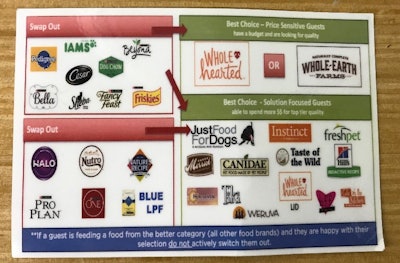
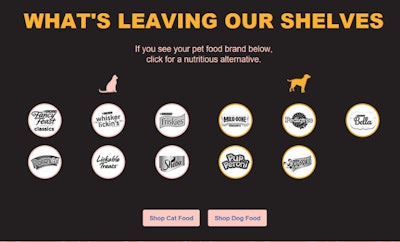
Petco is still missing the mark!
Petco’s ban on artificial preservatives, flavors and colors is admirable; however, I go back to my original assessment in my last article. Many of the foods being culled from their stores appear in food, drug and/or mass stores – which means these low-margin products are simply taking up valuable real estate for potential higher-margin products.
To put it in perspective, go onto Petco’s website and simply search for canine dry food, wet food or treats and sort by most popular. For dogs, I chose to look up canine wet foods and treats since those are the brands chosen to leave the shelves and where the bulk of the “boogeyman” ingredients reside. I did not see any of the culled products in the top 400 popular products (I would have looked longer but it was tedious).
For the top 100 treats, a bulk box of Milk-Bone resided in the number 50 spot and Pedigree Dentastix took spots 71, 77 and 88. Thus, making Petco’s ban on artificial foods and ingredients not very impressive, nor their “first step on the journey” (how it is phrased now).
Still geeking out in the pet food aisle
As you are aware, I do like to geek out in pet food stores and aisles. As I walked through Petco, I found at least 20 artificial ingredients that did not make their list (see Table 1).
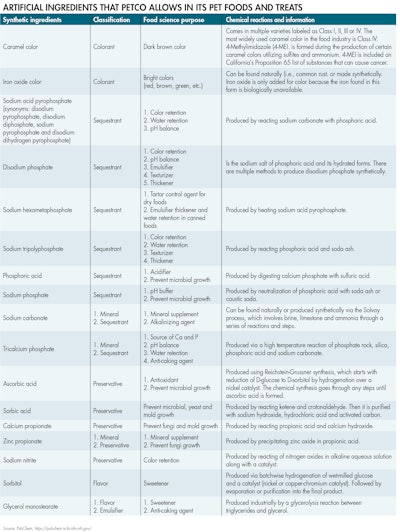
Table 1: A walk through Petco aisles reveals pet foods with artificial ingredients not on the banned list.
For those who are wondering: Yes, there are natural alternatives to such synthetic ingredients. Some examples include and are not limited to celery salt as a nitrite source (color retention); dried cultured skim milk as a propionate source (prevents fungus and mold growth); lactic acid, citric acid or vinegar as an acid source (prevents microbial growth); and egg, egg whites, plasma or gums for texture (aids in water retention and firms up product).
Additionally, I am not certain how Petco will enforce the new mandate with pet food companies since they do not have signed agreements or affidavits in place. They are simply relying on the ingredient statements to be the source of truth. For example, what happens if someone analyzes for BHA/BHT or ethoxyquin in a food sold by Petco? Is the pet food company liable, is Petco liable or both?
Other concerns about Petco’s promises
In 2014, Petco announced they would no longer sell products made in China. This somewhat bold and progressive decision was made because of the thousands of complaints and deaths associated with Chinese manufactured chicken jerky. One of the key opinion leaders on the March 24, 2019, conference call was quick to point this out. I followed with the question, “Did you also ban Chinese-sourced ingredients or just manufactured foods?” When the conversation went silent (crickets, crickets, crickets), I reminded them that the largest pet food recall resulting in pet deaths occurred in 2007 with Chinese-sourced ingredients adulterated with melamine.
The short answer is Petco did not know if Chinese-sourced ingredients were used in any of the foods in any of their stores. Not that I am bashing Chinese manufacturing or Chinese-sourced ingredients. It simply comes down to what your messaging is and whether you are being transparent. Also, we as an industry are fully aware that China is a major producer of certain vitamins and minerals. Thus, the likelihood of Chinese-sourced ingredients being in Petco stores is real.
Lastly, in a Forbes article, Ron Coughlin (CEO) is quoted, “Petco sees its partnership with JustFoodForDogs as an example of a pet food company that puts pets first in meeting each dog’s specific dietary and nutritional needs with food fit for human consumption.” I asked the team on the conference call if they read my article, “Are human grade pet foods really human grade?” Not surprisingly, the answer was no. (For the record, I did send it in an email to the head veterinarian and it was linked in my previous blog post about Petco.)
I explained to them that if all their Petco kitchens were not registered as human grade facilities, then they would not be considered human grade pet foods and that would be considered a false and misleading claim – because the claim “human grade” in pet foods is not only about the ingredients you use, it is also about the facility they are made in and the remainder of the human grade product food chain. Said differently, you should be seeing a similar restaurant grading system in their stores. Or maybe this is just another “first step in a longer journey” as well?
Summary
Obviously, Petco has a lot of work to do to reach their audacious goals that Ron Coughlin was quoted stating in the Forbes article. I leave you with this one question: How can Petco invite the pet food industry to step it up when they themselves have not?
It is my hope that Petco will continue to keep the open dialogue and evolve either their messaging and their commitment to pet parents.
NOTE: This blog has been updated to include Table 1: Artificial ingredients that Petco allows in its pet foods and treats

